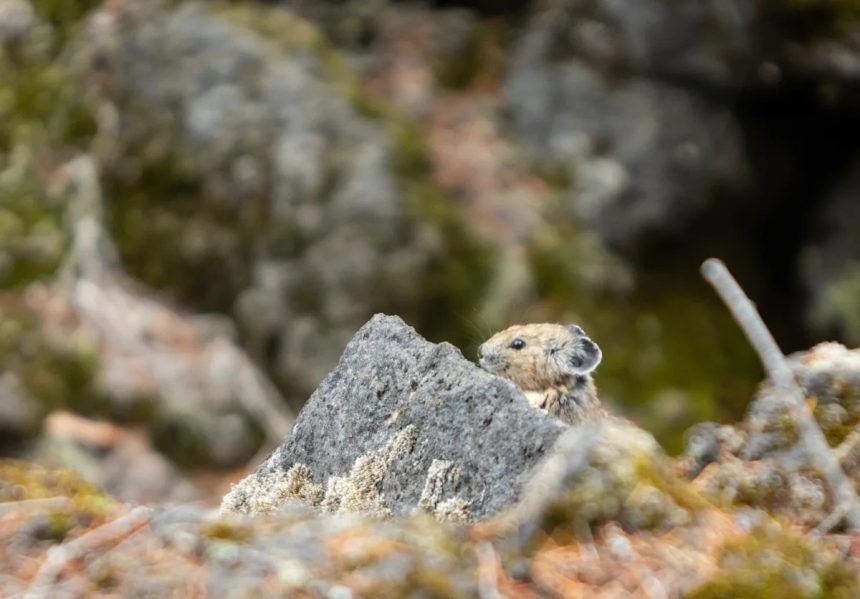Erika Anderson is sitting in silence on a rocky talus slope just off the McKenzie River Trail, scanning the landscape with binoculars.
In the distance, a small squeak, like the sound of a dog toy, echoes through the forest. It’s the sound of an American pika — a cute potato-sized mammal, closely related to rabbits, and exactly what Anderson has been listening for. In a flash, a small brown body with short rounded ears sprints across the rocky slopes and disappears again.
“I see him!” said Anderson, a research assistant for Oregon State University. “He’s collecting vegetation, which is fun. They’re fast.”
Anderson is watching for pikas here in the Central Cascades not only because they’re cute, but because they’re a “species of greatest conservation need in Oregon” with a small or declining population. One-third of pikas have disappeared from their previously known habitats in Oregon and Nevada, according to the National Wildlife Federation.
A pika is seen on a talus slope on Sept. 11 on the Mckenzie River Trail.
There has been minimal research done on pikas in the Central Cascades, near Clear Lake and the McKenzie River corridor. Anderson wants to expand the data since they’re a good candidate species for indicating the impact of climate change in the West.
“We’re out here studying them to first, figure out where they are, and second, determine what their resilience and persistence looks like into the future in the face of a changing climate,” Anderson said.
While pikas have been studied in the Columbia Gorge, Crater Lake and Newberry Volcanic Monument, Anderson is studying them for the first time in the central Oregon Cascades, in montane environments of Willamette and Deschutes national forests. Pikas are very sensitive and can start to overheat at temperatures over 80 degrees and have limited dispersal ability.
Montane environments are more susceptible to climate change because of changes in precipitation, annual snowpack and maximum and minimum temperatures throughout the year, she said.
“They are one piece of a puzzle in this greater ecological structure, ” Anderson said. “Given that they are a species of conservation concern, we’re just interested in learning more about them, particularly where they occur and what their resilience looks like, so that we can better conserve them in the future.”
Researching pikas
At least once a week, along rocky, talus slopes, near hiking trails, Anderson sits and observes for 25 minutes, noting any sightings or sounds of pikas in the area. Pikas are territorial creatures, and will call out in a distinctive high-pitched squeak.
After the 25 minutes, she’ll search the rocky areas and talus slopes for signs of fecal pellets and hay piles. She’ll gather samples of fecal pellets to be analyzed for questions concerning population conductivity and adaptive genes for future uses.
“(Local extinction) is believed to be related to climate change — changes in temperature throughout the year but also changes in snowpack,” Anderson said.
There are no studies that indicate how many pikas are in Oregon because many places in Oregon are under-studied. But pika monitoring programs, like the Cascade Pika Watch by the Oregon Zoo, suggests that pika numbers in the Columbia River Gorge are steadily increasing following the 2017 Eagle Creek Fire, according to a 2024 news release.
Volunteers can help search for pikas
Researching pikas isn’t a solo mission for Anderson. She relies heavily on volunteers to conduct surveys at the other 85 pika sites across central Oregon.
“To do all this work, we are asking for community volunteers to come out and do surveys with us,” Anderson said.
Volunteers can go to the Oregon Department of Fish and Wildlife’s volunteer page, and search for American pika, and register to become a volunteer.

Erika Anderson searches for hay piles and pika feces in the talus slope on Sept. 11 on the Mckenzie River Trail.
By surveying montane environment areas that have not been studied in the past, researchers like Anderson and volunteers can gather information that helps fill gaps in their understanding of pika distributions and assess their resilience to climate change.
Mariah Johnston is an outdoors journalism intern at the Statesman Journal. Reach her at mjohnston@gannett.com.
This article originally appeared on Salem Statesman Journal: Why OSU researchers are searching Oregon Cascades for pikas









